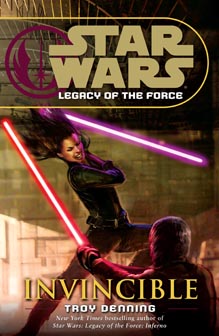The “Legacy of the Force” series – which often featured excellent writing despite the flawed central premise of Jacen Solo turning evil – goes out with its most frustrating entry, Troy Denning’s “Invincible” (2008). Although a round-robin interview at the back of the sixth book, “Inferno,” leaves no doubt that Aaron Allston, Karen Traviss and Denning enjoyed collaborating, this marks a second time where Denning drops the baton from Traviss and goes off on his own, less interesting direction.
The first example was the handoff from book two to three: Traviss had established that Jacen knew he had to kill Tenel Ka and Allana in order to achieve the sacrifice needed to be a successful Sith, but then Denning had Jacen dawdle over the definition of his required sacrifice. In the handoff from book eight to nine, Denning opts to not explore the ramifications of the split of the Galactic Alliance into two factions (Darth Caedus’ and Niathal’s) and instead entirely focus on the Jedi aspect of the galactic war. This would be like if “Return of the Jedi” featured the Luke-Vader showdown but not the rest of the Battle of Endor.
To be fair, Denning had this happen to him, too. He handed off the compelling idea of a Sith enclave on Korriban from book six to seven, but Allston marginalized it. (This thread was partially a continuity nod to Darth Krayt and the “Legacy” comics, and it would also be picked up for the next book series, “Fate of the Jedi.”)
In multiple threads, “Invincible” plays out like Denning just wants to wrap this up and go home. Ben turning Tahiri back from the dark side basically consists of him saying “C’mon, you’re not really evil” and her agreeing. She had murdered Pellaeon and Shevu by this point, and the former murder will make for a courtroom drama in “FOTJ” with the defense arguing that Tahiri was manipulated by Caedus. (Although Tahiri is guilty as sin, I actually was rooting for her in that court case because it is pushed by the hypocritical new Chief of State Daala, who wants justice for her friend, Pellaeon.)
The conflict that launched “Legacy of the Force” in the first place gets extreme “Let’s just wrap this up” treatment. In the epilogue, Jaina learns from her parents that the various factions (the Coruscant-based GA, the Fondor-based GA, the Confederation, Daala’s Imperial Remnant and the Moffs’ Imperial Remnant) all signed an agreement to rejoin as the Galactic Alliance under the compromise-candidate Chief of State Daala. So readers are three steps removed from seeing this historic agreement play out on the page, despite the fact that negotiations and political maneuvering got a significant page count earlier in the series. Stunningly, Admiral Niathal, who shared chief of state duties with Caedus and who engineered the GA split and the government-in-exile on Fondor, is in “Invincible” only as an off-page reference.
The peace accord is something that needed to play out in detail for a reader to grasp it. For one, Caedus didn’t start the GA vs. Confederation conflict, he merely escalated it and used it to rise to power. The central conflict – that the Confederation doesn’t want to pay taxes or contribute to a shared military – remains unresolved after Caedus’ death. Denning implies that the two GA factions and the Imperial Moffs join up when the dust settles and their combined military might forces the Confederation to the negotiating table. And then the back pages of the paperback, promoting “Millennium Falcon” and “FOTJ,” imply that stability ensues. But the disagreements are still there, so at best, this seems like a time-out borne of a war-weary population.

Speaking of war-weariness, Denning briefly touches on one theory that gives verisimilitude to Jacen’s fall and should’ve been explored further: the idea that he has only known a galaxy at war in his lifetime. Of course, the fact that there’s always a war in “Star Wars” is the elephant in the room throughout the EU, but it could’ve worked to the saga’s advantage here. If Jacen had known periods of peace, perhaps he would’ve understood that more war isn’t the path to peace. Additionally, he grew up within governmental (as the son of a chief of state) and quasi-governmental structures (as a Jedi), never holding a job not funded by taxpayers, so it makes sense that he’d only see top-down solutions. A big end speech from Caedus illustrating this tragic misunderstanding might’ve put a more satisfying bow on his arc.
The second thing that’s glossed over in “Invincible’s” resolution is that Daala is a ridiculous compromise candidate. Literally any other character would be a better compromise candidate; even Boba Fett would be a better choice. Yes, the “Star Wars” EU is making a parallel to the modern U.S. about how people sometimes are OK with having horrible people as their leaders, but it’s still jarringly nonsensical. Daala’s track record is just as bad as Caedus’; the only difference is that she’s a couple decades removed from her war crimes. This is a woman who tested out a batch of AT-ATs on a village on Dantooine in “Dark Apprentice” just for fun. Putting Daala (and the Moffs, and others who deserve it) up for war crimes would be a better path to galactic peace than giving her power; at the very least, there should be a sizable faction protesting Daala, just as Caedus’ leadership caused a rift. In any remotely sane galaxy, Daala is not a harbinger of peace.
Other storylines are taken for granted, too, even if we can guess the details from context clues. In the first lightsaber duel between Jaina and Caedus, on the mining asteroid Nickel One, Luke uses Force-projection to project himself over Jaina, thus making Caedus think he is fighting Luke. But we don’t get a scene of Luke later explaining to Jaina the reasoning for this strategy or why he didn’t tell Jaina about it. I think the vague notion is that Luke thinks Jaina won’t defeat Caedus at that point, and he wants her to retain the surprise factor for when she is ready to defeat him.
Later, Tenel Ka and Allana escape a nanovirus launched by the Moffs, but it all happens off page. And Tahiri leads GA troopers against the temporary Jedi Academy on Shedu Maad, but there’s no sense of the layout of the academy and we don’t meet any of the students or teachers stationed there.
OK, now for some things I liked. Broadly, Denning has become a writer who keeps me turning pages, whereas in his first book, “Star By Star,” he overwrote things. So while he drastically underwrites some things in “Invincible,” it’s still better than the other extreme.
Specifically, it’s cool that Jaina fights Caedus about 100 pages into the book, rather than Denning giving us endless build-up to a conclusive duel. Although it turns out to be the first of two fights, there’s a real sense that Caedus’ reign could end here and the rest of the book could be about the resolution of the war (If only that were the case). And I like that the second lightsaber duel isn’t drawn out: Jaina kills Caedus, and his last words and thoughts are about the safety of Tenel Ka and Allana. So Caedus gets a fittingly tragic end, rather than just going out as a cackling villain. Jaina did the right thing by killing him, but we can also latch onto the idea that Caedus was still 1 percent Jacen, someone we used to like.
Taryn and Trista Zel, Hapan security operatives who get flirty with Ben, are the latest fun little side characters in Denning’s arsenal. He also had fun with a pair of Coruscant homicide detectives back in book three, “Tempest.” His Sullustan-and-Ewok smuggler duo, last seen in book six, “Inferno,” is sometimes entertaining. His Squib trio that occasionally annoys Han and Leia overstays their welcome, but Denning has a solid track record for creating new characters – with Saba Sebatyne and Alema Rar being his most iconic contributions to the lore.
Not to sound like a broken record, but the biggest problem with “LOTF” is that it’s hard to read about Jacen turning evil. I regularly wished he would realize the error of his ways and turn back. There are significant silver linings to this series, as I’ve noted throughout my mostly positive reviews, and the EU editing team will go on to demonstrate awareness of the Jacen problem, as Luke and Ben explore the mystery of why Jacen turned evil in “FOTJ.”
I recommend “Legacy of the Force” on the grounds of it being a decent read, and Disney-era “Star Wars” fans might find it interesting to see the inspiration for (or at least a coincidental parallel to) “Episode VII.” That having been said, it’ll always bear the unofficial subtitle “The Destruction of Jacen Solo’s Character.”

